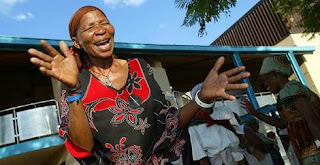photo: AFP
From the New York Times, Nov. 5, 2010, by Barry Bearak. Read it here. It's unfortunate that the term "Bushmen" is used in the headline, even if the article does acknowledge that the people in question often consider the term demeaning. Anthropologists abandoned this term ages ago, first adopting !Kung, and more recently, Ju/wasi.
The article deals with the "Bushmen" of Botswana and their struggle for survival, and the struggle of some against resettlement.
Here's an excerpt.
However humble their lives, the Bushmen of Botswana’s central Kalahari are well known to the world, the subject of books, films and anthropological studies. They are frequently portrayed — or, as many say, romanticized — as classic hunter-gatherers, a living link to humankind’s collective beginnings.
But for decades, they have been entrenched in a tug of war over their fate that has often gone unnoticed, a saga now replete with edicts and court cases, with alcohol abuse and sundered families, with an aboriginal people despairing about the uncertainty of their future.
Since the 1980s, Botswana, a landlocked nation of two million people, has both coaxed and hounded the Bushmen to leave the game reserve, intending to restrict the area to what its name implies, a wildlife refuge empty of human residents. Withholding water is one tactic, and in July a High Court ruled that the government had every right to deny use of that modern oasis, the borehole. An appeal was filed in September.

No comments:
Post a Comment